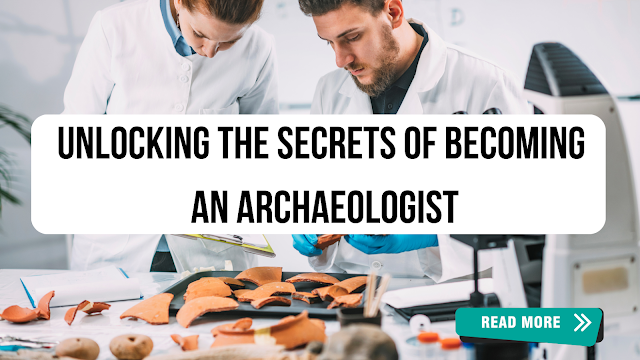Unlocking the Secrets of Becoming an Archaeologist
To become an archaeologist, you must first satisfy the
educational criteria and then go through the following procedures in the order
presented to you:
1.
Obtain a degree of at least bachelor's level.
You are required to finish an undergraduate degree
programme and get your bachelor's degree in anthropology or any other
discipline that is linked to anthropology, such as geography or history. After
finishing your upper secondary education (10+2), you will be eligible to engage
in a programme leading to a Bachelor of Arts degree in archaeology from the
best private university in Bhopal. During the course of your studies, you will
be responsible for conducting expert evaluations of archaeological remains and
may even take part in excavation efforts. You will find that this facilitates
analysis and interpretation of historical data.
2.
Participate in an internship.
Archaeology positions sometimes require applicants to
have previous field experience, which may be obtained via internships or
fellowships. Museums, archaeological groups, and government agencies are
examples of potential employers that may provide internship opportunities in
the field of archaeology. You will be able to determine whether or not you are
suited for the task by participating in an internship, which will help you
choose whether or not this is the best path for your future after completing
your graduation from the best private university in Bhopal.
3.
Complete a master's degree programme.
Although a bachelor's degree qualifies you for certain
entry-level professions, the vast majority of archaeologists choose to continue
their education and get a master's degree after completing their undergraduate
studies. Earning a master's degree from the best private university in Bhopal
gives you a deeper grasp of the subject matter as well as the opportunity to
hone your technical abilities. M.A., M.Phil., Diploma, and PG Diploma are all
examples of typical master's degrees that may be earned in archaeology or a
discipline linked to it.
4.
Think about getting your PhD.
If you are interested in leading high-level projects
or working as an archaeology professor, you should seriously consider acquiring
a doctoral degree in archaeology or a discipline that is closely linked to
archaeology. In addition to the few months spent doing field research for a
particular dissertation, earning a doctorate often requires a commitment of
three years of full-time study.
5.
Become a member of an archaeological organization.
When you become a member of an archaeology
organization, you put yourself in contact with others who share your enthusiasm
for the discipline and a commitment to preserving cultural traditions. You will
be able to keep up with the most recent archaeology news and read relevant
periodicals if you join these societies. Your network will grow, you will be
able to share your research, and you will expand your talents if you join a
local society. Additionally, the contacts you establish might assist you in
securing greater job possibilities in the future.
6.
Draw out a curriculum vitae.
An impressive curriculum vitae (CV) that highlights
your relevant education, talents, and experience will really help you stand out
to prospective employers. When you are preparing your curriculum vitae, put the
emphasis on the parts of your experience that are relevant to archaeology and
the particular area in which you wish to develop your professional career. If
you are applying for a career as a historical archaeologist, for instance, you
should emphasize your expertise in the field rather than your experience in the
classroom after completing your graduation from the best private university in
Bhopal.
7.
Start looking for a job.
After completing your bachelor's and master's degrees,
you have the option to look for work in a variety of fields, depending on your
interests. After finishing school, it is essential to look for a job that suits
your skills and interests in order to begin gaining experience and advancing
your career. Associate archaeologist, collections manager, cultural resource
expert, historic preservation officer, excavation technician, heritage
consultant, and laboratory technician are all examples of positions that
archaeologists may have when they first start out their career after completing
their studies from the best private university in Bhopal.

.png)
.png)
Comments
Post a Comment